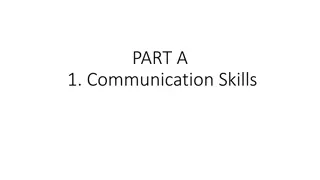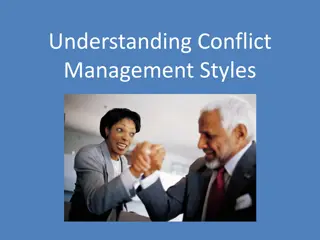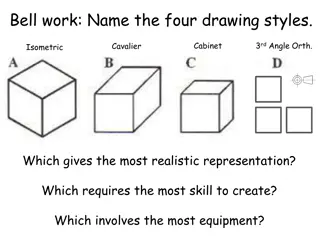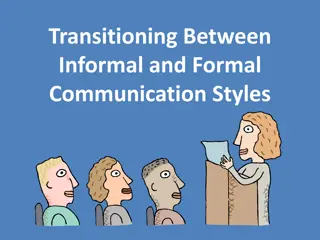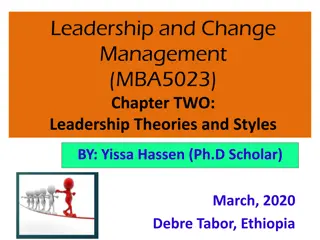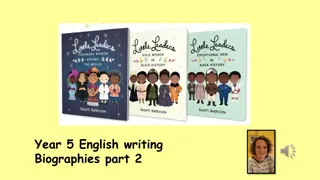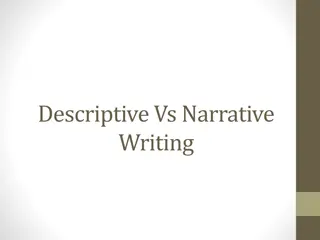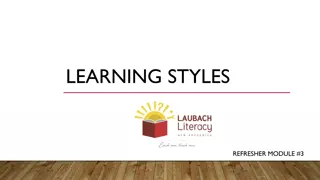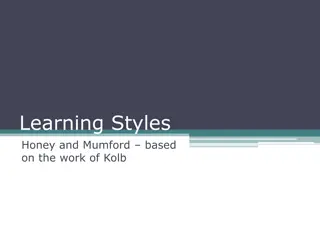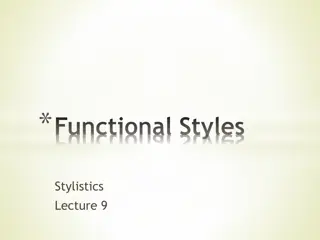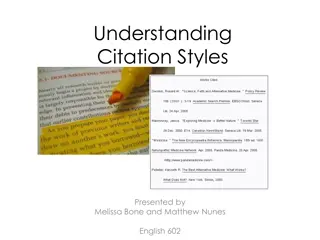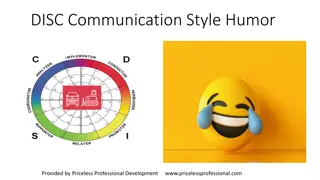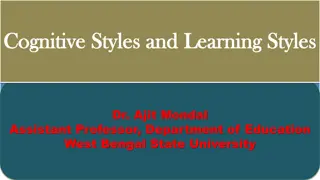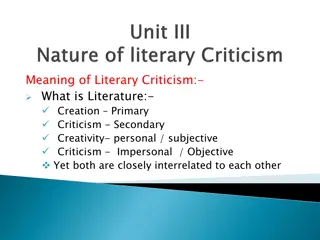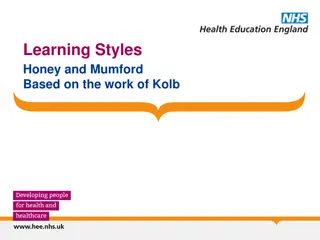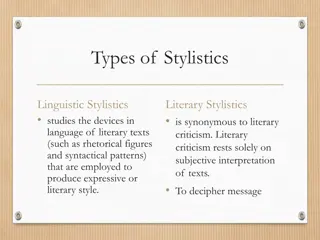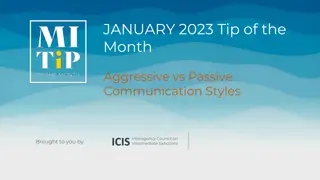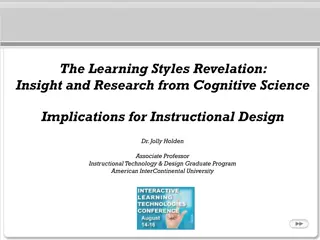Knowledge Sharing on Leadership Styles and Employee Performance During Pandemic Crisis
Mavis Adoko of the Ministry of Sanitation and Water Resources presents a knowledge-sharing session on her Master's thesis focusing on leadership styles and employee performance during the Covid-19 pandemic. The study explores various leadership styles' impact on employee performance, challenges face
0 views • 15 slides
Effective Communication: Understanding Styles and Advantages
Communication encompasses various styles including verbal, non-verbal, visual, and written forms. Each style plays a crucial role in conveying information efficiently. Written communication offers advantages like creating a permanent record, meticulous presentation, easy circulation, and suitability
10 views • 21 slides
Enhancing Literary Appreciation Through Stylistics and Ornamentation
Explore the world of literary texts with Md. Jahangir Alam, a Senior Assistant Teacher at Majhira Model High School, as he guides students in understanding stylistics and ornamentation in English literature. Through experimental learning cycles and activities like analyzing similes, metaphors, and e
1 views • 17 slides
Understanding House Styles: A Brief Overview
House styles encompass a variety of architectural designs, with buildings classified based on shared characteristics like roof shape, window placement, and construction materials. Early American house styles, such as American Colonial, reflect the diverse origins of settlers in North America. Coloni
3 views • 25 slides
Understanding Conflict Management Styles in Campus Life
Conflict management styles play a crucial role when resolving issues on campus. Knowing how to handle conflicts effectively is key to managing stress and navigating various situations. This article explores different conflict origins, the positive aspects of conflict, five common conflict management
0 views • 14 slides
Understanding Behavioural Styles: The Analyst (Technician)
Explore the concept of behavioural styles introduced by David Merrill and Roger Reid in the 1960s, focusing on the Analyst style. This style embodies traits such as organization, setting long-term goals, high standards, duty, analysis, directness, decision-making, task-oriented focus, risk-taking, a
0 views • 28 slides
Conflict Management Strategies in Organizational Behavior
Explore strategies for managing conflict and negotiation in the workplace, including the importance of conflict resolution and crucial conversations. Learn about the history of negotiating techniques within organizational behavior, the definition of conflict, types of conflict, stages of the conflic
2 views • 36 slides
Understanding Drawing Styles in Engineering
Explore the different drawing styles used in engineering, including Cabinet, 3rd Angle Orthographic, Cavalier, and Isometric projections. Learn about the benefits and limitations, key features, and applications of each style. Gain insights into the skill levels required, equipment needed, and practi
0 views • 19 slides
Various Styles of Food Service Management Explained
The serving of food is an art that can enhance or harm the reputation of a catering establishment. Different food service styles such as formal waiter service, self-service, vending, and contract catering play a crucial role in how food is presented and served. This article explores the nuances of i
0 views • 19 slides
Mastering Communication Styles: Informal vs. Formal
Explore the nuances of transitioning between informal and formal communication styles, understand the components of different forms of communication, and learn when to apply each style in appropriate situations. Delve into the characteristics and examples of informal and formal communication, and di
0 views • 18 slides
Leadership Styles and Theories: An Overview
Explore the concept of leadership styles and theories, focusing on the different types of leadership styles such as autocratic, democratic, and laissez-faire. Learn about the components of a manager's leadership style, including motivation approaches, decision-making styles, and areas of emphasis in
4 views • 24 slides
Mastering Quotations in Literary Analysis
Essays in the Literary Tradition sequence often require interpretive analysis arguments, built from articulate and defendable claims. This presentation by Dr. Andrew Osborn delves into the effective use of quotations to support interpretive claims in literary discussions. Learn how to incorporate em
1 views • 53 slides
Understanding Formal and Informal Writing Styles: A Guide for Year 5 Students
Explore the concepts of formal and informal writing styles through engaging activities and examples in this educational resource tailored for Year 5 English students. Learn to distinguish between the two styles, understand the criteria for each, and practice transforming sentences from informal to f
1 views • 18 slides
Essentials of Literary Translation: Understanding the Art and Skill of Interpreting
The process of literary translation involves creativity, cultural understanding, and maintaining the essence of the original text. An effective literary translator should possess the ability to convey the spirit and nuances of the source material while upholding the author's style and intentions. Av
0 views • 25 slides
Understanding Literary Criticism: A Comprehensive Overview
Literary criticism involves the study, evaluation, and interpretation of literature, focusing on themes, styles, settings, and historical contexts. This discipline explores the meanings, workings, and values of literary works through interpretation, analysis, and evaluation. Various types of literar
2 views • 20 slides
Understanding Love Styles in Relationships Based on Attachment Theory
Early life experiences play a crucial role in shaping how we love in relationships. Milan and Kay Yerkovich have developed tools rooted in attachment theory to help individuals understand and improve their love styles. People tend to fall into five categories of Love Styles, such as the Avoider, who
1 views • 22 slides
Understanding Descriptive vs. Narrative Writing Styles
Delve into the nuances of descriptive and narrative writing, exploring the differences between these two styles. Learn how each style conveys information, from sensory details in descriptive writing to storytelling in narratives. Discover similarities between the two styles and how to structure essa
2 views • 9 slides
The Age of Dryden: Literary Output in Restoration England
The literary period known as the Age of Dryden during the Restoration era in England marked a shift in cultural, artistic, and literary landscape. Set against the backdrop of historical events such as the English Civil War and the Restoration of Charles II, this era saw the emergence of new themes,
1 views • 12 slides
Understanding Learning Styles and Criticisms: A Comprehensive Overview
Delve into the concept of learning styles, explore different approaches, and learn how to incorporate visual, auditory, and kinesthetic learning in lesson planning. Uncover the controversies surrounding learning styles, criticisms against fixed style theories, and insightful discussions on matching
1 views • 26 slides
Understanding Learning Styles: Honey and Mumford Based on Kolb's Work
Explore the four learning styles proposed by Honey and Mumford, which are based on the work of Kolb. The four styles are Activists, Reflectors, Theorists, and Pragmatists. Each style is characterized by unique traits and preferences for learning methods. Activists thrive on new experiences and chall
0 views • 10 slides
Understanding Different Types of Service Styles in Hospitality Management
Explore various service styles such as American, English, French, and Russian, each offering a unique dining experience in the hospitality industry. From pre-plated dishes to tableside preparations, these service styles cater to diverse preferences and occasions.
0 views • 13 slides
Understanding Functional Styles in Language Stylistics
Functional styles in language stylistics encompass various classifications such as scientific, official, publicist, newspaper, and belles-lettres styles. The complexities of these classifications arise from intertwining styles, historical variations, and connections with genres. Different scholars l
0 views • 18 slides
Importance of Understanding Citation Styles in Academic Writing
Understanding different citation styles is crucial for academic writing across various disciplines. It helps students comprehend the role of citation in different communities, research methodology, and the value of knowledge in diverse fields. Citation practices in the humanities emphasize authority
0 views • 12 slides
Understanding Functional Styles in Language
The notion of style is explored in language use, including variations in literary and non-literary contexts, register linguistic features, and style-shifting according to formality. Definitions and classifications of style emphasize the distinctive features characteristic of register, genre, or auth
0 views • 30 slides
Enhancing Learning Through Active Strategies and Learning Styles
Implement active learning strategies to engage students, deliver and review content, and foster collaboration. Explore Kolb's Learning Styles to accommodate diverse learner preferences and maximize learning outcomes. Integrating learning activities based on individual styles can create a more effect
0 views • 22 slides
Understanding Different Communication Styles and Behaviors in Everyday Situations
Explore the humorous insights into various shopping tendencies, movie theater behaviors, elevator interactions, golf course preferences, newspaper reading styles, and desk habits based on DISC communication styles like Dominance (D), Influence (I), Steadiness (S), and Conscientiousness (C). Discover
0 views • 9 slides
Understanding Cognitive Styles and Learning Styles in Education
Cognitive styles explore an individual's preferred way of thinking and problem-solving, while learning styles delve into how individuals acquire and process information. These styles influence attitudes, values, and social interactions. By understanding one's own cognitive and learning styles, one c
0 views • 24 slides
Russian Formalism and American New Criticism Overview
Russian Formalism, a literary movement that emerged in the early 20th century, was a radical departure from traditional approaches to literary analysis. It sought to define literary criticism as a scientific profession, focusing on the autonomy of literature and employing linguistics for support. Th
0 views • 22 slides
Understanding Literary Criticism: Exploring the Art of Interpreting and Evaluating Literature
Literary criticism, rooted in ancient Greek and Roman traditions, involves interpreting, analyzing, and evaluating literary works. It has evolved over time, encompassing various theories and approaches to engage with literature critically. From mimetic theory to analytical criticism, different persp
0 views • 11 slides
Understanding Learning Styles: Honey and Mumford's Approach
Explore the learning styles proposed by Honey and Mumford based on the work of Kolb. The four main styles - Activists, Reflectors, Theorists, and Pragmatists - are detailed with characteristics, ideal learning methods, and areas where each style may struggle. Discover how individuals with different
0 views • 10 slides
Understanding Linguistic and Literary Stylistics
Linguistic Stylistics explores devices in language of literary texts to create expressive styles. Literary criticism relies on subjective interpretation, while Stylistic Analysis in linguistics identifies patterns in speech and writing. This content delves into the phonological, graphological, and l
0 views • 17 slides
Understanding Aggressive vs. Passive Communication Styles in Cognitive Behavioral Therapy
Explore the impact of communication styles on outcomes in cognitive behavioral therapy. Learn to identify default communication styles and strategies to promote assertive communication. Discover the benefits of replacing default styles with assertiveness for better interpersonal interactions.
0 views • 4 slides
Enhancing Presentations with Verdana Font and Bold Text Styles
This presentation showcases the use of Verdana font and bold text styles to create visually appealing slides. From title slides to layout designs, the use of different font sizes and styles is illustrated. Additionally, the color scheme and default settings for fonts and drawing styles are highlight
0 views • 16 slides
Comparative Analysis of University Literature Essays in Different English-Speaking Countries
Investigating variations in writing styles and tutor expectations among UK, New Zealand, and USA universities is crucial for Effective Academic Practices (EAP). Examples from Swiss universities and comparisons between British and American essay writing styles highlight the importance of understandin
0 views • 39 slides
Understanding Learner Styles and Strategies
Learner styles and strategies play a crucial role in education. There are two main types of learners - Analytic Learners who focus on details first, and Holistic Learners who prefer understanding the whole concept. Analytical learners excel at recalling facts, excel in math and science, and are good
0 views • 37 slides
Leadership Styles and Behaviors in "Leadership and the One Minute Manager
Leadership and the One Minute Manager" by Tanner Gibson explores different leadership styles ranging from directive to supportive behaviors, with examples like directing, coaching, supporting, and delegating. The book outlines how appropriate leadership styles can be applied based on individual comp
0 views • 16 slides
Learning Styles and Instructional Design: Debunking Misconceptions
The concept of learning styles as predictors of learning outcomes is widely misunderstood. Research shows little impact on learning outcomes. This presentation explores the implications for instructional design and questions the relevance of considering learning styles as a variable in instructional
0 views • 56 slides
Understanding Memory Hierarchy and Different Computer Architecture Styles
Delve into the concepts of memory hierarchy, cache optimizations, RISC architecture, and other architecture styles in embedded computer architecture. Learn about Accumulator and Stack architectures, their characteristics, advantages, and example code implementations. Explore the differences between
0 views • 52 slides
Mastering Styles, Themes, and Master Pages for Web Applications
Explore the importance of styles, themes, and master pages in achieving a unified website design. Learn about different style types, such as inline, internal, and external, and how CSS provides consistent formatting properties. Discover how to create basic inline styles and utilize tools like Style
0 views • 24 slides
Understanding Quotation Analysis and Literary Terms in Literature
Exploring quotation analysis and literary terms in literature is essential for understanding the deeper meaning and context of literary works. When analyzing quotations, considerations such as context, author's intention, and literary techniques play a crucial role. Additionally, familiarizing onese
0 views • 53 slides

